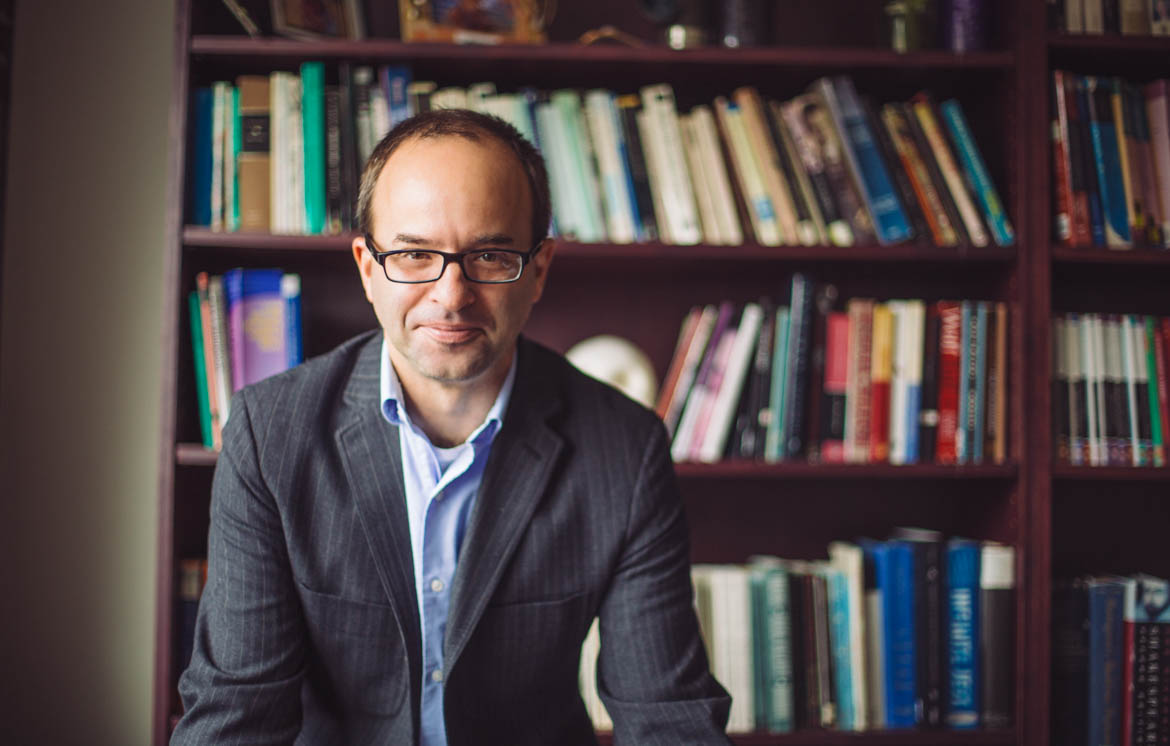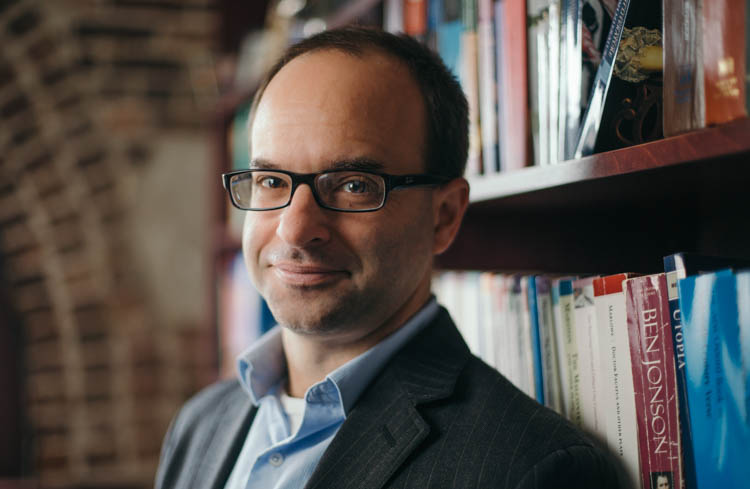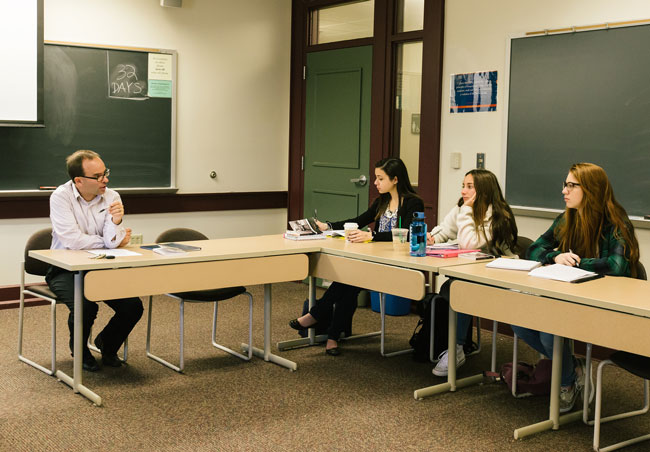

Prof. Christopher D'Addario is a time traveler. Or that’s what his research calls to mind. As an English professor who is also interested in history, he cares about bringing to life early modern British literature for students—not just the facts and figures of what was happening during that time period, but actually getting them to imagine what life had been like in the 16th and 17th centuries.
“With my recent work, I’ve tried to get my students to think three-dimensionally,” D’Addario said.
His recent work will take the form of a book, his second, about the everyday life of Londoners during Shakespeare’s time. For his first book, Exile and Journey in Seventeenth-Century Literature, D’Addario had been reading about the lives of people who left England because of the English Civil War or other conflicts. Many of them moved to France or New England, and D’Addario became interested in how their lives changed as a result.
“I realized I didn’t even know what a person did [during that time period] when they woke up in the morning,” he said. “So I figured I would start with that.”
 D’Addario started researching people’s habits and what London would have looked, felt, and sounded like. For example, the most prominent noise in 17th century London would not have been the hum of machinery or the white noise of electronics today, but the sound of running water. There was virtually no plumbing, so water flowed through conduits, and you could hear its steady stream throughout the city. Just as they do today, all these small things—the background noises and hum of daily life—impacted Londoners’ overall lives, even when they didn’t notice them.
D’Addario started researching people’s habits and what London would have looked, felt, and sounded like. For example, the most prominent noise in 17th century London would not have been the hum of machinery or the white noise of electronics today, but the sound of running water. There was virtually no plumbing, so water flowed through conduits, and you could hear its steady stream throughout the city. Just as they do today, all these small things—the background noises and hum of daily life—impacted Londoners’ overall lives, even when they didn’t notice them.
“I became interested in how [those things] changed the way people saw the world,” said D’Addario, “the notion of what the world was, where the Earth was situated in the larger universe—the strangeness of the natural world.”
Last semester, D’Addario arranged a trip for his senior seminar students to visit the American Shakespeare Center's Blackfriars Playhouse in Staunton, Virginia, so they could experience what going to the theater would have been like during Shakespeare’s time. There would have been many differences compared to today. For example, the audience would have likely been noisy, talking throughout the show. The lighting would have included the audience, not just the stage, and the audience would have served as an integral part of the production—as much so as the actors and props. There would have also been seating on the stage. Any female characters—Juliet, in Romeo and Juliet for instance—would have been played by young men or boys. D’Addario discussed with his students how race was performed and talked about costuming and special effects. He asked them to think about the cultural significance and impact of what they learned.
 What ties the courses D’Addario teaches together is this focus on what the details of daily life can teach us about history—and ourselves. In another of his classes, the First-Year Seminar called A Day in the Life, he asks students to examine how extraordinary, and sometimes even the seemingly insignificant moments, can impact people’s lives.
What ties the courses D’Addario teaches together is this focus on what the details of daily life can teach us about history—and ourselves. In another of his classes, the First-Year Seminar called A Day in the Life, he asks students to examine how extraordinary, and sometimes even the seemingly insignificant moments, can impact people’s lives.
“The boring stuff is meaningful,” he said. “The little interactions with people might change your day, or your life. And, if one day can change your life, what does that say about our identities if you could become a completely different person because of it?”
D’Addario himself was set on a scholarly path in graduate school by two professors who taught an interdisciplinary course on early modern British literature. Before then, D’Addario hadn’t known what time period he would study, but he became fascinated by how history could bring literature to life.
“The 16th and 17th centuries are fascinating,” he said. “Henry VIII divorces his wife and the Catholic Church. Elizabeth rules as queen and several decades later the English people rebel and kill their own king. The fact that I had an English professor who could tie the history into the literature really led me to studying that time period.”
Now in his fifth year of teaching at Gettysburg, D’Addario has had the opportunity to see his own group of students come to him as first-years and graduate as seniors.
“The goal as someone who teaches an older time period is to not just get students interested in it, but to also allow them to inhabit that world—getting them to imagine living like someone else,” he said. “A liberal arts school is the perfect place for that. It’s important for being a good human being and a citizen of the world to be able to empathize and understand what someone else is thinking and what it’s like to be that person. Even if my students don’t remember every historical fact from my classes, if I can teach them that habit of mind, that’s the most important thing I would like them to take from my classes."
Gettysburg College’s first-class faculty embraces innovation and cutting-edge developments in their field. The benefit to students is clear: when professors are excited about and engaged with new thinking and discovery, they communicate this enthusiasm and knowledge in the classroom. Find out more about what our faculty members are researching, and how they use that research to engage students in the classroom.
Bringing a 16th-century love story to light
GMOs, bad and SMOs, good? Not so fast.
Prof. Amy Evrard on what we should know about women in the Muslim world
The toughest lady in the Wild West and other American folktales
Why social entrepreneurship? Prof. Chitvan Trevedi shares.
Writing my first opera: A reflection by Sunderman Prof. Avner Dorman
Questions even a professor can’t answer
A new use for drones: Eavesdropping


